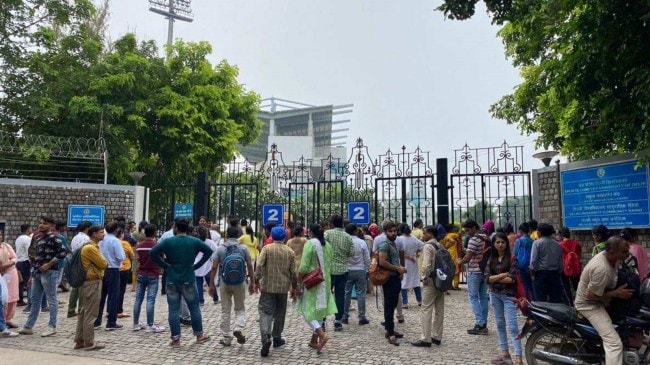Opinion What the UGC must do to transform higher education in India
A common challenge in our higher education system is political interference at local, state, and central levels in critical areas such as faculty hiring, syllabus design, and research funding. These issues are severely undermining the system
 Should we adhere to the Western model that originally shaped our universities, develop a framework rooted in our own historical learning methods, or create a hybrid model that blends the best of both to meet local and global needs?
Should we adhere to the Western model that originally shaped our universities, develop a framework rooted in our own historical learning methods, or create a hybrid model that blends the best of both to meet local and global needs? With the ongoing public debates surrounding the University Grants Commission’s (UGC) new initiatives aimed at overhauling the higher education system in India, a crucial question arises: Should we adhere to the Western model that originally shaped our universities, develop a framework rooted in our own historical learning methods, or create a hybrid model that blends the best of both to meet local and global needs?
As we know, Western models of higher education primarily emphasise research that contributes to societal knowledge. This approach fosters collaboration between socially-driven agencies and university departments, working together to find solutions, drive innovation, and generate new knowledge. In contrast, Indian universities, given the vast number of students aiming for degrees primarily as a pathway to secure employment, often place research on the back burner. Although the UGC has introduced several regulations to streamline PhD programmes, cultivating a strong research culture remains a relatively new endeavor for us.
Given the UGC’s commitment to enhancing the standards of higher education in our country, it would be ideal for it to seek recommendations from experts in the field. Some key observations are as follows:
Protecting academic freedom is crucial to ensure transparency and foster growth. Transparency means that the appointment of vice chancellors and registrars should be free of any financial influence; these positions should be awarded solely based on academic achievements, administrative experience, and the vision candidates bring to their prospective roles. If appointments are driven by monetary power, the very notion of “quality” in higher education becomes meaningless.
A common challenge in our higher education system is political interference at local, state, and central levels in critical areas such as faculty hiring, syllabus design, and research funding. These issues are severely undermining the system. Often, the ruling party dictates what should and should not be taught. Similarly, funding agencies tend to prioritise research themes based on the preferences of those in power rather than allowing principal investigators the academic freedom to choose their own areas of study. Likewise, we frequently hear about money and influence affecting faculty recruitment and promotions. Unless these deep-rooted issues are addressed, achieving excellence in higher education will remain a distant dream.
The most crucial aspect that needs to be addressed in our higher education system is quality rather than the excessive emphasis we often place on quantity. Higher education should be reserved for those with a genuine academic interest in gaining knowledge. Academic degrees should not serve merely as a prerequisite for employment. What we study and what we ultimately do for a living often have little connection. In most cases, we acquire job-specific skills through hands-on experience after recruitment rather than from what we learned in schools and colleges.
Our education system largely fails in bridging the gap between classroom learning and real-world application. One of the biggest mistakes we, as a society, continue to make is equating academic degrees with job eligibility. This mindset has significantly restricted the true purpose of higher education — pursuing research. Consequently, research is often seen as just another degree to be earned, rather than as a rigorous intellectual pursuit aimed at generating new knowledge.
Making a research degree a mandatory criterion for teaching job selection has significantly diluted the quality of our research programmes. True research is an intuitive and voluntary pursuit that requires full-time commitment, strict adherence to rigorous guidelines, and, ultimately, the generation of new insights and understanding in the chosen field.
Similarly, in today’s higher education system, teachers receive excellent salaries. However, merely increasing salaries without implementing strict measures to assess performance has led to a sense of complacency within the community. This calls for serious introspection: Are we truly justifying the compensation we receive through our contributions to education and research?
For teachers, academic growth is often measured through journal publications and the conferment of awards. However, some faculty members resort to publishing in dubious journals and obtaining awards through payment. To uphold academic integrity, the UGC must implement strict policies to discourage such practices and ensure genuine scholarly contributions.
University rankings by various agencies are frequently discussed, but their authenticity remains questionable. For instance, the recent scandal involving NAAC members accepting bribes for rankings has exposed serious flaws in the system. In reality, institutions often fabricate documents to secure higher rankings. Given these concerns, the UGC must explore alternative methods to assess and ensure the quality of higher education.
Finally, to enhance India’s higher education system, the UGC should consider implementing several key measures. These include introducing research-based assessments, fostering interdisciplinary learning and critical thinking, and reducing reliance on contract faculty by investing in permanent recruitment and training. Promoting research in Indian literature and philosophy, strengthening community engagement, and ensuring a healthy work-life balance for faculty and students are equally important. Mandatory counselling services should be introduced to support student well-being, while universities must collaborate with policymakers to address challenges such as healthcare, education, and climate change. Increasing student autonomy in course selection, integrating emerging fields like Artificial Intelligence and encouraging student start-ups through university support are also crucial. These initiatives should form an essential part of the UGC’s strategic vision to transform higher education in India.
The writer is associate professor of English, Tumkur University




